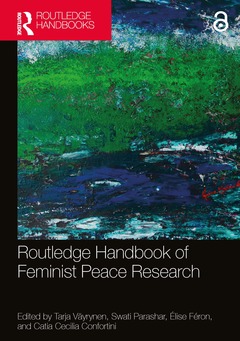Routledge Handbook of Feminist Peace Research
Coordonnateurs : Väyrynen Tarja, Parashar Swati, Féron Élise, Confortini Catia Cecilia

This handbook provides a comprehensive overview of feminist approaches to questions of violence, justice, and peace.
The volume argues that critical feminist thinking is necessary to analyse core peace and conflict issues and is fundamental to thinking about solutions to global problems and promoting peaceful conflict transformation. Contributions to the volume consider questions at the intersection of feminism, gender, peace, justice, and violence through interdisciplinary perspectives. The handbook engages with multiple feminisms, diverse policy concerns, and works with diverse theoretical and methodological contributions.
The volume covers the gendered nature of five major themes:
? Methodologies and genealogies (including theories, concepts, histories, methodologies)
? Politics, power, and violence (including the ways in which violence is created, maintained, and reproduced, and the gendered dynamics of its instantiations)
? Institutional and societal interventions to promote peace (including those by national, regional, and international organisations, and civil society or informal groups/bodies)
? Bodies, sexualities, and health (including sexual health, biopolitics, sexual orientation)
? Global inequalities (including climate change, aid, global political economy).
This handbook will be of great interest to students of peace and conflict studies, security studies, feminist studies, gender studies, international relations, and politics.
Chapter 9 of this book is freely available as a downloadable Open Access PDF at http://www.taylorfrancis.com under a Creative Commons Attribution-Non Commercial-No Derivatives (CC-BY-NC-ND) 4.0 license.
Introduction Part I: Methodologies and Genealogies 1. Genealogies of Feminist Peace Research: Themes, Thinkers, and Turns Annick T.R. Wibben 2. Feminist Care Ethics: Contributions to Peace Theory Tove Pettersen 3. Methodologies for Feminist Peace Research Annika Björkdahl and Johanna Mannergren Selimovic 4. Queer Theories of Peace and Security Emil Edenborg 5. Everyday Peace in Critical Feminist Theory Shine Choi 6. Feminist Responses to Conflict: Within, Against and Beyond the Law Kiran Kaur Grewal 7.Gendering Education for Peace: Critical Perspectives Shweta Singh 8. Women, Patriarchy and Traditional Methods: A Postcolonial Feminist Critique of Pashtun Jirga.Farooq Yousaf Part II: Politics, Power, and Violence 9. Continuums of Violence: Feminist Peace Research and Gender-based Violence Punam Yadav and Denise M. Horn 10. Sexual Violence in Times of War and Peace Sara Meger 11. Feminist Peace versus Weapons of Violence Ray Acheson 12. Feminist Responses to Violent Extremism Katherine E. Brown 13. Armed Resistance and Feminist Activism Magda Lorena Cárdenas and Jenny Hedström14. Feminism. Militarism. Whatever: Civil Military Operations in Afghanistan Gunhild Hoogensen Gjørv 15. Can Armed Service be Emancipatory? Complex Answers from Nepal and the United States Megan MacKenzie and Keshab Giri 16. Silencing and Voicing the Subaltern Nompumelelo Motlafi Part III: Institutional and Societal Interventions 17. Feminist Approaches to Peace and Conflict: International Human Rights Law Disappearing and Re-emerging? Kate Ogg and Louise Craker 18. Foreign Policy and Diplomacy: Feminist Interventions Nadine Ansorg, Toni Haastrup, and Katharine A. M. Wright 19. Women, Peace, and Security Soumita Basu and Akhila Nagar 20. Peacekeeping: Feminist Debates and Demands Aiko Holvikivi 21. Not Enough Soldier, Not Enough Civilian: The Continuing Under-Representation of Female Soldiers in Disarmament, Demobilisation, and Reintegration (DDR) Programmes Leena Vastapuu 22. Trauma, Memory, and Peacebuilding Hanna Ketola 23. Feminism and Peace Movements: Engendering Anti-Nuclear Activism Catherine Eschle 24. The Arts as a Peacebuilding Approach: Feminist Contributions and Directions Nilanjana Premaratna and Praveena Rajkobal Part IV: Bodies, Sexualities, and Health 25. Bodies/Biopolitics/Identity: Feminist Perspectives Sarah Smith and Christine Agius 26. Embodying Transformations: Feminism, the Yoga Body, and Social Change Emanuela Mangiarotti 27. Sexual Health and World Peace Maria Tanyag 28. Sexual Orientation and Gender Identity or Expression (SOGIE) in Violent Conflict and Peacebuilding Jamie J. Hagen, Megan Daigle, and Henri Myrttinen 29.Men, Masculinities, and Peace, and Violence: A Multi-level Overview on Justice and Conflict Jeff Hearn, Kopano Ratele, Tamara Shefer, and Anisur Rahman Khan 30. Gendered Nationalism, Military Masculinities, and Bodies Bram J. De Smet and Ihntaek Hwang 31. Intergenerational Feminist Peace: Global Research and a Case Study from Aceh, Indonesia Zubaidah Djohar and Lesley Pruitt 32. Gender and Disasters Margaret Alston Part V: Global Inequalities 33. Climate Change, Gender, and Peace: Thinking Differently in a Brave New World? Nicole Detraz and Sonalini Sapra 34. Is Feminist Peace Possible? Constraints and Opportunities in a Global Political Economy Sarah Hewitt and Jacqui True 35. Feminist Approaches to Forms of Labour Edmé Domínguez Reyes and Lisa Sutton 36. Development and Foreign Aid Itziar Mujika Chao and iker zirion landaluze 37. Feminised Work, Invisible Labour: Against the Formal-Informal Economy Dichotomy Elena B. Stavrevska 38. Famines: ‘Slow’ Violence and Gendered Memorialisation Swati Parashar and Camilla Orjuela 39. Global Mobilities Anitta Kynsilehto 40. Gender and Diaspora Élise Féron
Tarja Väyrynen is Professor in Peace and Conflict Research and Research Director of Tampere Peace Research Institute, Tampere University, Finland.
Swati Parashar is Associate Professor in Peace and Development at the School of Global Studies, University of Gothenburg, Sweden.
Élise Féron is Senior Research Fellow at the Tampere Peace Research Institute, Tampere University, Finland.
Catia Cecilia Confortini is Associate Professor of Peace and Justice Studies at Wellesley College, USA.
Date de parution : 09-2023
17.4x24.6 cm
Disponible chez l'éditeur (délai d'approvisionnement : 14 jours).
Prix indicatif 53,83 €
Ajouter au panierDate de parution : 03-2021
17.4x24.6 cm
Thèmes de Routledge Handbook of Feminist Peace Research :
Mots-clés :
peace; feminism; gender; research; discourses; actors; violence; power; resistance; bodies; institutions; research methods; Conflict Related Sexual Violence; feminist peace research; Young Men; sexual violence; International Monetary Fund; socio-economic inequality; DDR Process; conflict resolution theory; Unequal Gender Dynamics; gender identity; War Time; WPS Agendum; International Humanitarian Law; Peace Education Scholars; Feminist Peace Researcher; Feminist Peace; WPS Resolution; Social Reproduction; Peace Education; Critical Peace Education; Feminist Political Economic Analysis; Nuclear Disarmament; Mainstream Women’s Organisations; Feminist Care Ethics; DDR Programme; GBV; Youth Peacebuilding; Emergency Contraceptive Pill; Feminist Foreign Policy; Lone Actor Terrorism



